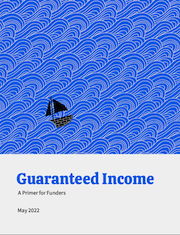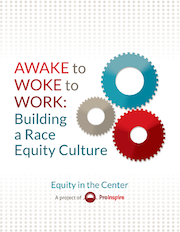Site Search
- resource provided by the Forum Network Knowledgebase.
Search Tip: Search with " " to find exact matches.
Foundations Facilitate Diversity, Equity, and Inclusion: Partnering with Community and Nonprofits, a new report by the OMG Center for Collaborative Learning, confirms that foundations can, in fact, facilitate diversity, equity, and inclusion (DEI) through their grantmaking processes and their partnerships with nonprofits—and identifies eight specific practices for foundations to emulate.
The report takes a deep dive into the work of nine foundations that represent a diverse cross-section of types and sizes, and offers useful lessons about how foundations can better partner with nonprofits to be more effective in their work.
Community foundations are beginning to deepen and shift how they work, adopting an anchor mission that seeks to fully deploy all resources to build community wealth. Moving into territory relatively uncharted for community foundations, they are taking up impact investing and economic development — some in advanced ways, others with small steps. This report offers an overview of how 30 representative community foundations — including The Seattle Foundation, the Vermont Community Foundation, and the Greater Cincinnati Foundation — are working toward adopting this new anchor mission.
This Democracy Collaborative report was written by Marjorie Kelly, Senior Fellow and Director of Special Projects and Violeta Duncan, Community Development Associate.
What comes after “strategic...?” If you said, “planning,” you’re not alone. And for many leaders of community foundations, especially small ones who don’t have the time or money for a big process, anxiety is the feeling that follows. If that’s the case, this guide is for you.
It invites you to test-drive some activities to bring your current program, operations and community leadership strategies into focus before you decide whether to create a plan or not. It helps you discover ongoing strategic practices and decide whether to keep them or not. If you already have done a strategic plan, and it is languishing on a shelf, this guide will help you refresh it.
PART A: Good Strategy Takes Practice (Not Just Planning)
PART B: Do Your Discovery
PART C: Jumpstart Your Strategy Narrative
PART D: Bring It Together
Looking To What’s Next
"Co-Creation" is a case study about the Connecticut Early Childhood Funder Collaborative, a project of the Connecticut Council for Philanthropy. The case study, written by Patricia Bowie, examines co-creation, an emerging systems change collaboration model which grew out of a funder-and-state partnership. This unique partnership led to the creation by executive order of a new and independent Office of Early Childhood, which was formally approved by the Connecticut State Legislature in 2013. The companion piece, "Taking on New Roles to Address 21st Century Problems," looks at co-creation from the perspective of a regional association of grantmakers.
The Connecticut Early Childhood Funder Collaborative comprises 14 funders from around the state who bring many years of experience in supporting and operating programs that serve the needs of children and families.

This weekly funder briefing webinar series welcomed New Jersey-based grantmakers along with national funders and provided an opportunity for grantmakers to hear from a wide range of nonprofit experts. This series started on March 13, 2025, less than a month after the first executive order was issued and continued through April 24, 2025. The written summaries of each recording are listed below.
This advocacy and civic engagement toolkit is designed for community and public foundations that want to educate and encourage their grantees about getting involved in civic and policy activities to increase organizational capacity and impact. While its primary focus is on the grantmaking activity of these foundations, the toolkit also addresses rules and guidance for policy involvement by foundation officials acting on behalf of their foundations.
At a recent Ocean & Monmouth Funders Roundtable, the group discussed all of the different databases and lists of nonprofits available to philanthropy to be able to research new and different nonprofits.
BD (Becton, Dickinson and Company), a leading global medical technology company, today announced a $1 million commitment over five years to UNICEF USA in support of UNICEF's work to uphold the rights of all children and help every child survive and thrive. The cash donation will be used to support UNICEF's efforts to eliminate Maternal and Neonatal Tetanus (MNT) in at-risk countries around the world. In 1997, BD was the first U.S.-based corporation to establish a maternal and newborn tetanus program with UNICEF.
With the support of BD, UNICEF is working to eliminate maternal and neonatal tetanus worldwide by seeking to vaccinate all women and girls of childbearing age, by promoting clean childbirth delivery practices such as clean umbilical cord cutting methods and by utilizing surveillance to enhance health professionals' understanding of the circumstances under which tetanus can be transmitted. Between 2000 and 2018, newborn deaths from MNT have declined by 88 percent.1
As the first and longest-serving corporate partner in UNICEF USA's campaign to eliminate MNT, BD has now provided or committed more than $10.8 million in cash and product donations to the organization, including 55 million BD SoloShot™ Auto-Disable Syringes and BD Uniject™ Non-Reusable Devices.
"The initiative to help eliminate MNT was the first philanthropic program established by BD," said Tom Polen, CEO and president, BD. "Over the past 24 years, the MNT initiative has grown into an international public-private partnership that includes governments, global humanitarian organizations, non-profits and corporate partners, all with one mission to prevent unnecessary deaths from maternal and neonatal tetanus. This $1 million commitment continues our collective efforts to expand access to health care among the vulnerable populations who need it most and is part of our broader purpose – advancing the world of health."
The New Jersey Council for the Humanities has awarded 18 grants totaling $216,319 in its most recent grant round. These funds will support a diverse array of projects in nine counties across the Garden State, highlighting NJCH’s ongoing commitment to fostering the public humanities.
Of the 18 awarded projects, five had their beginnings in prior NJCH grants or programs.
Two organizations, the AIDS Resource Foundation for Children and the Hispanic Family Center of Southern NJ, received funding for projects that expand upon the Dear Rosa Project, an oral history initiative amplifying the voices of women living with HIV/AIDS that was funded by a prior NJCH grant. Additionally, Clinton Hill Community Action and Raíces Cultural both received funding to extend projects initially developed in NJCH’s Community History Program. And Truehart Productions received funding to produce a new episode of the PBS documentary series “The Price of Freedom,” which previously received developmental funding from an NJCH incubation grant.
“We are thrilled to see the continued impact and evolution of projects that have received our support in the past. Their success demonstrates the profound influence of our programs on the public humanities in New Jersey,” NJCH Executive Director Carin Berkowitz said. “The diverse and dynamic projects funded in this round will significantly contribute to the understanding and appreciation of our state’s rich cultural heritage.”
As artificial intelligence (AI) and technological advances take on an increasingly prominent role in our society, BIPOC and immigrant communities face the threat of biases and outright hostilities being encoded and automated into surveillance, enforcement, and judicial tools. At the same time, creative leaders in the nonprofit sector are leveraging and building new technologies to better deliver culturally responsive services at scale to their communities. In this two-part series on the intersection of AI, technology and immigrant justice, GCIR invites funders to deepen their knowledge in the space as well as gain insights on how philanthropy can deploy investments that build the movement’s capacity to respond to emergent threats and opportunities.
Part 2: Tech for Good: Building Innovative Tools to Serve Immigrant Communities
In the hands of creative and justice-driven leaders, computer technologies hold significant potential for advancing the public good. Across the country, nonprofits are harnessing the power of AI and building innovative tech tools to bridge gaps in culturally responsive services while expanding their organizational impact. From accessible legal tools, to on-demand translation services, to tech-based workforce development, the movement for immigrant justice is leveraging technology in creative ways to transform and scale service delivery. In this discussion, funders will learn from talented innovators about the tools they have built and how philanthropic investments can catalyze this burgeoning field.
Speakers:
Swapna Reddy, Co-Founder & Executive Director, ASAP
Daisy Magnus-Aryitey, Co-Founder & Co-Executive Director, Code the Dream
Bartlomiej Skorupa, Co-Founder & Chief Operating Officer, Mobile Pathways
Alex Mitchell, Product Manager, Tarjimly
This tool for unstaffed foundations includes an accountability self-assessment and a legal checklist. It is divided into nine topic sections, each of which is divided into three levels, which can help foundations tailor the tool to meet their specific interests and needs. Also included are an Excel spreadsheet to help tabulate responses, an extensive accountability resource list, and a glossary of key words and concepts used in the tool.

